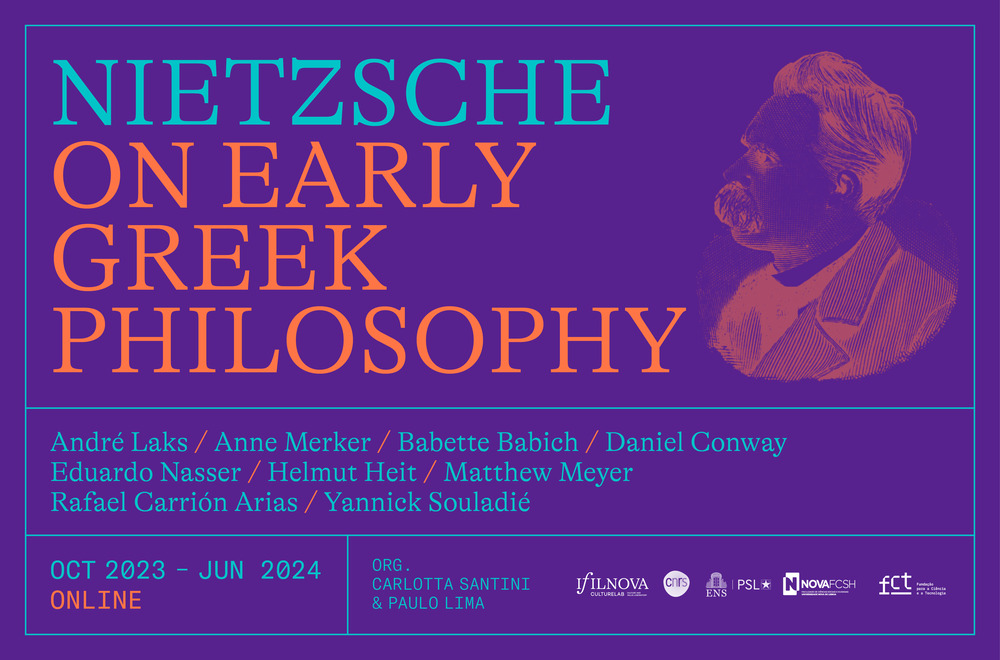
Nietzsche on Early Greek Philosophy – Online Seminar
Org. Paulo Lima (Lisbon Nietzsche Group/IFILNOVA) & Carlotta Santini (CNRS/ENS, Paris)
The ‘Tremendous Leap of Anaximander’: Nietzsche’s New Understanding of the Apeiron”
Yannick Souladié (Institut des Textes et Manuscrits Modernes – CNRS/ENS – Paris)
Nietzsche was one of the first great philosophers to really emphasise the importance of Anaximander and to give him a place among the major Greek philosophers. According to “The Preplatonic Philosophers”, Anaximander made a ‘tremendous leap’ in the history of thought. With the concept of apeiron, Anaximander appeared to the young Nietzsche as the true founder of the Western metaphysical tradition. However, as much as the young Nietzsche emphasised the importance of Anaximander, he almost disappeared from his texts after he broke with Wagner and Schopenhauer.
The aim of this lecture is to examine the mature Nietzsche’s conception of Anaximander and of the apeiron. We shall see whether the different conceptions of the apeiron and the will to power can be reconciled. Does the relative disappearance of Anaximander indicate that Nietzsche has stuck to his metaphysical and Schopenhauerian conception of his philosophy? Is the connection that the young Nietzsche established between the tragic philosophies of Anaximander and Heraclitus still relevant in the texts of his maturity? Can we still discern Anaximandrian traits in the Heraclitus of 1888? Finally, could the contemporary figure of Anaximander as the founder of scientific thought, as sketched out by Carlo Rovelli, who makes him the equal of Newton for the history of physics, find an echo in the texts of the last period?
Link:
https://videoconf-colibri.zoom.us/j/98703201771
The seminar seeks to explore the dialogue between Nietzsche and early Greek philosophy during the period when he was Professor of Philology at the University of Basel. This is a subject that has not been studied in a systematic way, although there are some decisive contributions showing its importance for understanding Nietzsche’s philological and philosophical thinking. Our purpose is to provide a platform on which contributions from specialists in Nietzsche and ancient philosophy can be presented, debated, and complemented to fill this gap in Nietzschean studies. Key topics of the sessions will be Nietzsche’s activity as a scholar of ancient doxography on early Greek philosophy, his general conception of what he called the “pre-Platonic philosophers”, as well as his interpretation of some of these philosophers. The body of texts to be studied during the sessions includes not only the published ones, but also Nietzsche’s lectures, notebooks, and correspondence. The seminar is part of the activities of the Lisbon Nietzsche Group and the Research Group on Ancient Philosophy (CultureLab/IFILNOVA). It is the result of a collaboration between IFILNOVA, the Centre Nationale de Recherche Scientifique, and the École Normale Supérieure (Paris). It will take place monthly starting from October 2023 and will have nine sessions. It will be open to all interested parties, who will be able to register for each session by contacting the organizers (plima@fcsh.unl.pt, carlottasantini@hotmail.it). For more details, please see the programme below.
Org. Paulo Lima (Lisbon Nietzsche Group/Research Group on Ancient Philosophy/IFILNOVA) and Carlotta Santini (CNRS/ENS, Paris)
NEXT SESSIONS
Session 78 May, 4 PM (Lisbon) | 5 PM (Rome) | for other locations click here.
André Laks (Universidad Panamericana, México/Sorbonne Université, Paris): “Nietzsche doxographus”
Session 85 June, 4 PM (Lisbon) | 5 PM (Rome) | for other locations click here.
Daniel Conway (Texas A&M University), “How Socrates Became What he Was: The Evolution of a Diagnosis”
Session 919 June, 4 PM (Lisbon) | 5 PM (Rome) | for other locations click here.
Anne Merker (Université de Strasbourg), “Nietzsche, Heraclitus, and Polemos”
 Mark as favourite
Mark as favourite